Terrifying Moles
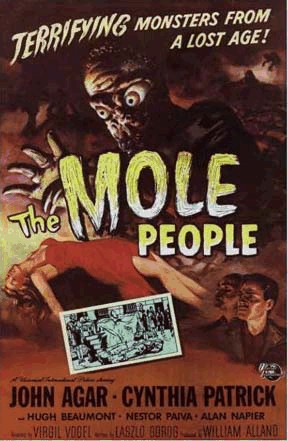

all about celery, gutta percha, neurasthenic shuddering, egg flip, the old town of Plovdiv, bags of suet, and papal infallibility. Plus starlings and terrifying moles, among much else.
“He has constructed a pandaemonium in an upper story of his museum, in which he has congregated all the images of horror that his fertile fancy could devise; dwarfs that by machinery grow into giants before the eyes of the spectator; imps of ebony with eyes of flame; monstrous reptiles devouring youth and beauty; lakes of fire, and mountains of ice; in short, wax, paint and springs have done wonders.” — Fanny Trollope, Domestic Manners Of The Americans
Keats had his elfin grot, and we learned last week that Owen Barfield had a foldured grot (see 27th August). There are a number of other grots deserving of attention, poetic and otherwise. Gervase Beerpint's “fuming, hapless grot” springs to mind - at least, to my mind - as an example of a so-called poetic grot that we really could have done without. It is the setting for one of his earliest poems, included in Crouton As Exemplar, the collection of Beerpint's teenage drivel which is mercifully out of print. A more appealing poetic grot is Scrimgeour's “ten-inch-tall toy plastic grot”, the abiding image from his astonishing narrative tour de force How I Lost My Bus Pass And Found It Again Last Tuesday, Not Without Certain Hazards. For me this is one of the greatest poems of the late 20th century, and its annual recitation at the Hooting Yard Festival Of Texts Related To Bus Travel never fails to warm the cockles of my heart.
As for non-poetic grots, who can fail to be excited by Dobson's grot? Aloysius Nestingbird tells us:
Dobson went on one of his “walks”, taking with him a copy of Cliff Castles And Cave Dwellings Of Europe by Sabine Baring-Gould, which was at the time his favourite reading. Upon his return, his brain was awash with it. “I must leave this building and find a grot in which to live out the rest of my days,” he shouted, and began poring over geological maps of the coast. All attempts to divert him from this mania were fruitless. He thought he had identified a suitable grot, one which was flooded by the violent incoming tide for only a few hours each day, and began moving his belongings thither, employing a local peasant who had a pony and trap. Only after four trips did this man demand payment from the impoverished pamphleteer, who thrust a spare bottle of vinaigrette dressing into his paws and begged him to continue. The peasant was understandably enraged, and threw the bottle back at Dobson.
Dobson's next ploy was to try to convince the railway authorities to build a new terminus within yards of his grot. They laughed in his face. He made one attempt to make the journey by bicycle, with a few kitchen utensils stuffed into his panniers, but his knees gave out before he was halfway there, and he abandoned the idea as hopeless.
What to do? Everything beginning with the letters A to J that Dobson owned was stacked in cardboard cartons in the faraway grot, subject to the relentless destructive power of the crashing waves which, twice a day, engulfed what he still thought of as his future home, for the peasant had ignored the instructions to suspend the cartons by chains from several handy stalactites. Dobson calculated how much cash he would need to take cab rides from his building to his grot, and was appalled. Indefatigable as ever, he decided to publish a new series of tracts on popular subjects, deluding himself that he would make enough sales to cover the cost of regular taxi fares. Marigold Chew's printing press churned out copies of Some Hurried Notes On Tab Hunter and Eight Things You Never Knew About Tuesday Weld, those anomalies in the Dobson oeuvre, but to no avail. Not a single copy was ever sold.
The dream came to an end on a particularly wet Tuesday in March. Tucking another bottle of vinaigrette dressing into his pocket, Dobson went to parley with the peasant. He bashed on the door of a tumbledown hut next to a ditch by the canal, forcing his mouth into a queasy smile. There was no answer, nor would there ever be an answer, for unbeknown to Dobson, the peasant had fallen victim to ergot poisoning, gone crackers, and run amok in the purple hills. The pamphleteer trudged home, sat with his head in his hands, drank fourteen mugs of tea, abandoned all thought of living in his grot, and set to work on his matchless essay Why I Do Not Live In A Grot, Elfin Or Otherwise. It was to prove a turning point in his career.
Source : Forgotten Corners Of Dobsoniana by Aloysius Nestingbird
Chapter Eleven of Hands Up; or, Twenty Years of Detective Life in the Mountains and on the Plains, A Condensed Criminal History of the Far West, Reminiscences by General D J Cook, Superintendent of the Rocky Mountain Detective Association, begins:
“In all the criminal history of Colorado - in all the register of the achievements of the Rocky Mountain Detective Association - the ensanguined pages show no more causeless, unprovoked murder than that of R B Hayward in September, 1879.”
Chapter Eleven of Unspeakable Desolation Pouring Down From The Stars by General F E Key, Superintendent of the Haemoglobin Towers Detective Association, on the other hand, while considerably less ensanguined, can be found by following this link.
“The sect of Jumpers was founded in the year 1760, in the county of Cornwall, by two fanatics, who were, even at that time, able to collect together a considerable party. By the use of certain unmeaning words they work themselves up into a state of religious frenzy, in which they seem to have scarcely any control over their senses. They then begin to jump with strange gestures, repeating this exercise with all their might until they are exhausted, so that it not unfrequently happens that women who, like the Maenades, practise these religious exercises, are carried away from the midst of them in a state of syncope, whilst the remaining members of the congregations, for miles together, on their way home, terrify those whom they meet by the sight of such demoniacal ravings.” — Justus Friedrich Karl Hecker, The Black Death And The Dancing Mania
Lo! In that year of torrential rainfall and storm clouds I set out from the city carrying with me nought but a few rags. I saw cows grazing, I heard horses whinnying. At the edges of farmyards I hid behind hedges. My appearance was not one to encourage some cherry-cheeked farmer's wife to invite me in for a dish of scrambled eggs. For days on end I ate nothing but berries, or scraps of leftover cake from countryside wedding parties abandoned in panic after visitations from extraterrestrial beings dressed up in glistening metallic space-clothing and armed with laser guns. Everywhere I went I saw evidence of burned-out barnyards and terrified geese. After roaming aimlessly for about three months, I came to a city by the sea. I sat on a milestone and gazed at the unfamiliar skyline. Some of the masts of ships docked in the harbour were taller than the buildings. I fed a handful of crumbs to the goose that had been accompanying me for the last few days, and patted its eternally bobbing head. “Let us march into that city and be bold!” I announced to the goose, pointlessly, for it did not understand a word of human language, being a goose. Nevertheless, it followed me as I hoisted my bag of rags on to my back and strode towards the customs post on the edge of the city. The weather was still tempestuous. I cannot count the number of puddles I squelched through, nor how many squalls set that little goose a-jitter. The customs post, when at last we lumbered up to it, was deserted, but for a man of great illness lying sprawled on a pallet, whose moans took only moments to irritate me. Indeed, the sound of human whining, after months of solitude, set my teeth on edge to such an extent that I bid the goose stifle him as best it could. The goose sat on the sick man's head while I rifled through the filing cabinets. It was at this precise moment that the press photographer bounded through the door and took snaps of the scene which will be familiar to you. Startled by camera flashes, the goose fled. I backed against the wall, ragged and, I must confess, wild-eyed. The sick man was transmogrified. Only now did I become aware of his police uniform, as he and the photographer exchanged a glance that conveyed some terrible significance. That is why I am writing to you from a prison cell. Thus far I have fed my interrogators a pack of lies, but I do not know how much longer I can hold out. Please, please, my darling, try as best you can to smuggle in a package of sellotape, soap, bleach, some pins, a map and a bale of plastic sheeting so that I can make good my escape!
Source : Letters From Prison by Joost Van Dongelbraacke
![]()
![]()
![]()
![]()
![]()
![]()
![]()
![]()
![]()
![]()
![]()
![]()
![]()
Shown above are the twenty six living members of the rather eerie Blot family. Ever since the night of the 1958 Munich Air Disaster, which wiped out the Busby Babes, the curiously ageless Blots have remained within the confines of the converted Pigsty Complex, just off the Blister Lane Bypass, where they forage for food, do meteorological readings, and ponderously intone ponderous incantations. Field recordings of the most ponderous of their incantations, the fourteen-hour Homage à Tippi Hedren, led to a mildly successful CD release. The Blot family are, left to right: Ajax, Blackguard, Cutty, Dismay, Elkan, Fod, Gazeppa, Histamine, Insurgent, Jörg, Kappatatap, Lynyrd, Mote, Nervewrack, Ornamental, Pap, Quinsy, Ringworm, Salman, Tharbin, Ultravox, Vincenzo, Windigo, Xerxes, Yolanda and Zap. Approach them, if you must, with caution, for they are skilful catapultists and have a stockpile of pebbles to ward off strangers.
To make Paste of Almonds. Take one pound of small Almonds, blanch them out of hot water into cold, then dry them with a cloath, and beat them in a stone Morter, till they come to Past, putting now and then a spoonful of Rose water to them, to keep them from Oyling, when they are beaten to fine past, take halfe a pound of Sugar finely beaten and searsed, put it to your past, and beat it till it will twist between your fingers and thumb, finely without knots, for then it is enough, then make thereof Pyes, Birds, Fruits, Flowers, or any pretty things, printed with Molds, and so gild them, and put them into your Stove, and use them at your pleasure.
Source : A Book Of Fruits And Flowers, Anonymous, London: Printed by M.S. for Tho: Fenner at the South entrance of the Royall Exchange, London, 1653.
This is an important new series in which we will be showing you the decorative wallpaper choices of various Potae. (Please note that we prefer Potae to Potuses for the plural of Potus, which is of course the correct manner of referring to the President Of The United States.) For security reasons we have only been given clearance to show a small patch of each wallpaper design. Here is a sample from Richard Milhous Nixon's White House rumpus room:

“Thither Dorrington followed him, gaining vigour and fury at every step. At sight of him the wretched Mallows sank in a corner, sighing and shivering with terror. Dorrington hauled the struggling wretch across the room, tearing off the crepe whiskers as he came, while Mallows supplicated and whined, fearing that it might be the other's design to imprison him in the enamelling oven.” — Arthur Morrison, The Affair Of The Avalanche Bicycle & Tyre Co., Ltd.
Gosh!
Devoted readers of Hooting Yard will no doubt be excited to learn that its onlie begetter has discovered that he has been immortalised in verse. The following is an extract from an essay entitled Owen Barfield's Poetic Diction: An Appreciation by Caryl Johnston. Follow that link if you want to read the whole thing, or spend some time at the Encyclopaedia Barfieldiana, if you so wish. Meanwhile, here is the excerpt:
The discussion between Barfield and Lewis about truth and meaning surfaced in the final poem of Pictures from the Speaking Stillness, “Mode Conceptual.” It is in two parts, and the first part is called “Frank Key.” The poet stands in “turning time,” locked outside the door of spring:
“Outside and gracious in the world / Flowers bloomed, and greening; / But I behind the darkened door / Could find no name for meaning. / It was the nameless ever moving / In the known, but from behind; / Sleeves brushed me by, ideas - / The clothing of the mind.”
Yet, there is no relief in this brain-bound darkness - the “foldured grot,” which is an improvisation on Keats' “elfin grot.” The foldured grot, like the Belle Dame Sans Merci, holds us prisoner. But someone named Frank Key comes to the rescue:
“I felt my hand inside a key - / It lightly weighed - no doubt - / I turned it slowly, and again, / And Frank came to take me out.”
“Frank Key” brings us the mystery of incarnated life: not the key in my hand, but the hand itself the key:
“‘To be,’ he said, 'it turns- / It fills up to the rim---'”
The poet receives this realization of meaning with tangibility:
“So there I was: while speaking / The spring to me had fled - / Meaning bloomed from word to word - / As speaking turned, to being said.”
The “being said” — the Being of Meaning, is the essence of this Barfieldian philosophical poem. It is the world of the Logos, of Meaning, that becomes fact, and it is this descent of meaning into fact that the poet must attempt to capture as the truth of things.

Owen Barfield, from whose pulsating brain Frank Key sprang forth
Having got rid of your piles yesterday by smearing yourself with boar's grease, it's time for a treat. Here is a splendid snacking idea from the Book Of Fruits & Flowers:
To make Printed Quidony of Quinces. Take two pound of Quinces, paired, coared, and cut in small pieces, and put them into a faire posnet, with a quart of faire water, and when they are boyled tender, put into them one pound of Sugar clarified, with halfe a pint of faire water, let them boyle till all the fruit fall to the bottom of the posnet, then let the liquid substance run through a faire linnen cloath into a clean bason, then put it into a posnet, and let it boyle till it come to a jelly, then Print it in your Moulds, and turne it into your boxes. You shall know when it is ready to Print, by rouling it on the back of a Spoone.
On the bonny bonny banks of the foul old loch, where a dredger plied from shore to shore, I saw my true love pluck some furze and place it in her hair. My true love was a wandering lass of a clan that herded cows, and she broke her back when she had a mishap with a trampoline. For her folk herded cows through the seasons long, but they also jumped and leaped. They would wander into the market square of a town down in some dale, and they'd bounce up and down and gambol about wearing coats of many hues. And the songs they sang! Oh, the songs they sang were as strange as strange could be. I remember one that went “Vienna - it means nothing to me”. All caked and painted were their carts, yellow, green and blue. But my true love's cart was black as pitch, as black as the raven and crow. I stand in the hills in an icy gale wondering where will my true love go? Green grow the rushes-oh, on those bonny bonny banks.
Such has been the interest in our planned series of Dennis Beerpint reprints (see 22nd August) that we have arranged to make a further three titles available:
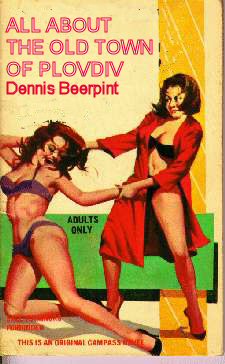
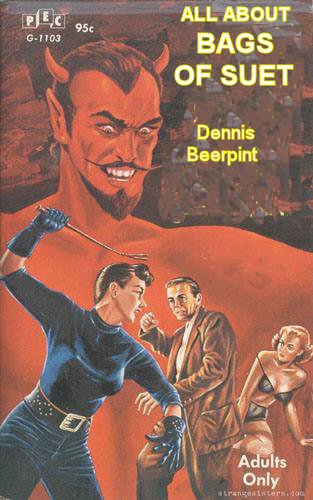
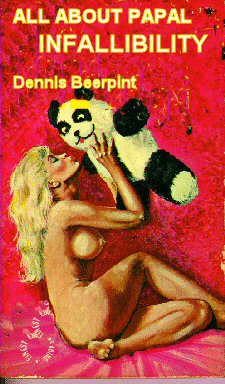
“The world is round. Time is fleeting. Is man an ox? No. Is he a patent inkstand? No. Was he created to occupy a house and fit his head to a hat? No. Then why delay? Why smother your longings? I says … this won't do. This ain't your destiny. Rise! Be winged! Chase the ideal! Get on the vastness! Seek and find.” — Arthur Colton, The Belted Seas
In the old town of Plovdiv, Ugo plopped his pod onto a stool. Ugo's ma said, “Ugo, why are you using a pod instead of a jar?” Ugo's ma was blind, but she knew that the plop of Ugo's pod was different to the plop of his jar. “Oh, ma,” said Ugo, “My jar is in the shed.” Ugo's ma bashed Ugo on the head. “Never leave your jar in the shed, Ugo,” she said, “When you do I will bash you on the head, as I just did.” Ugo said, “Sorry, ma. My pal Ulf put my jar in the shed.” “Ah,” said Ugo's ma. On Thursday last. In a hovel. In the old town of Plovdiv.
Regular readers know that here at Hooting Yard we devote ourselves to their amusement, instruction, and moral edification. To date, however, we have perhaps neglected our duty to address matters of physical health, and more specifically to suggesting remedies for common ailments. Thus it is that we plan, over the next days or weeks, to reprint excerpts from the anonymous 1653 text A Book Of Fruits & Flowers or, to give its full title, A Book Of Fruits & Flowers: Shewing The Nature and Use of them, either for Meat or Medicine. As Also: To Preserve, Conserve, Candy, and in Wedges, or Dry them. To make Powders, Civet bagges, all sorts of Sugar-works, turn'd works in Sugar, Hollow, or Frutages; and to Pickell them. And for Meat. To make Pyes, Biscat, Maid Dishes, Marchpanes, Leeches, and Snow, Craknels, Caudels, Cakes, Broths, Fritter-stuffe, Puddings, Tarts, Syrupes, and Sallets. For Medicines. To make all sorts of Poultisses, and Serecloaths for any member swell'd or inflamed, Ointments, Waters for all Wounds, and Cancers, Salves for Aches, to take the Ague out of any place Burning or Scalding; For the stopping of suddain Bleeding, curing the Piles, Ulcers, Ruptures, Coughs, Consumptions, and killing of Warts, to dissolve the Stone, killing the Ring-worme, Emroids, and Dropsie, Paine in the Ears and Teeth, Deafnesse.
We begin with a truly effective medicament for the piles:
Take a little Orpine, Hackdagger, and Elecampane, stamp them all together with Boares grease, into the form of an Oyntment, and lay them to the place grieved.
Should you have any difficulty obtaining boar's grease, I am sure the likes of Tesco and Sainsbury will respond to requests. Most big supermarkets now have “suggestion boxes”, and readers are encouraged to make use of them.
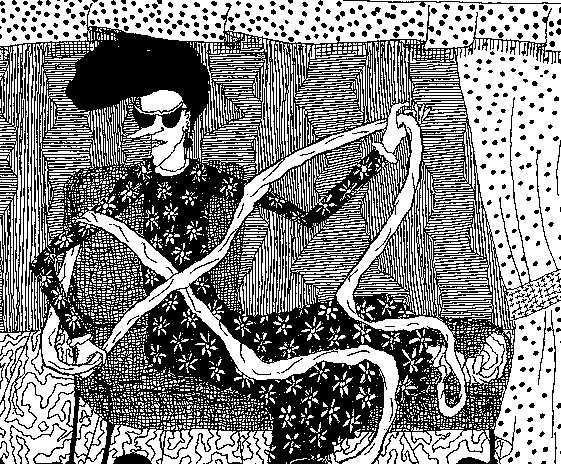
Minnie Crunlop first wore her trailing bandage after she was slightly injured during a fight with an ostrich. Quite what she was doing sharing a confined space with the panic-stricken bird is not known, and Ms Crunlop herself has been characteristically tight-lipped about the whole business. She is clearly fond of her bandage, however, because it still trails along behind her even though the injury has long since healed, according to her doctor, who does not give two figs, nor pins, nor a jot, nor even a tittle, for the confidentiality implicit in the doctor-patient relationship, and instead has taken to shouting from the rooftops that Ms Crunlop's bandage of lint is completely unnecessary. Please note that, for once, the phrase “shouting from the rooftops” is meant literally, adding another mystery to the affair. Who knows why, loudhailer in hand, Ms Crunlop's general practitioner clambers up often rickety and unsafe fire escapes, simply to bellow this - admittedly minor - detail of her medical history to all and sundry, most of whom have no idea who Minnie Crunlop is?
“Racine Mudge, his face distorted beyond all recognition, was making a marvellous inward movement, as though doubling back upon himself. He turned funnel-wise, like water in a whirling vortex, and then appeared to break up somewhat as a reflection breaks up and divides in a distorting convex mirror. He went neither forward nor backward, neither to the right nor the left, neither up nor down. But he went. He went utterly. He simply flashed away out of sight like a vanishing projectile. All but one leg.” — Algernon Blackwood, A Victim Of Higher Space
Last week I bumped into an old acquaintance in the street, and almost the first thing he said was, “Frank, tell me about nidor”. Luckily, I had just been reading Blodgett's Book Of Animal Sacrifice, and was able to spout forth much wisdom on the subject. It seems only fair to reprint here the passage which allowed me to impress my old pal. Note that the book is available in electronic format from www.blodgettglobaldomination.com/savagerituals/sacrifice/beastsofthefield.html
There is nothing better to put some zing into an overcast Thursday morning after a night of fitful sleep than to wander into the desert and sacrifice a quadruped. Goats, I feel, have been a little overdone - excuse the pun - as have rams. Why not try a bison, or even a dromedary? Before you can smell the wafting nidor of charred animal flesh, however, you will need to set up a sacrificial altar. Stone slabs are useful, but if there are none to hand, you can improvise using sticks and branches. Don't build your altar too high - remember you will have to tether your beast to it prior to slaughter. Once the altar is satisfactorily completed, I recommend that you ritually cleanse it. There are several very effective ritual cleaning agents on the market which shouldn't put too big a dent in your pocket. I usually use Dr Gillespie's Aromatic Camphor & Myrrh Preparation, but then I am very fond of the packaging. Some wailing and ululation while you scrub never goes amiss. Now, tie your bison, dromedary, or other quadruped to the altar and sprinkle it with something - herbs, space-age glitter-dust, talc, anything you like - and slaughter it. Making very careful use of your safety matches, ignite the dead beast and do a bit more wailing. The air will soon be heavy with nidor, especially if you fan the flames with palm leaves. When the fire has utterly consumed your sacrificial animal, do tidy up after you. The ashes may be cast unto the winds, or you may prefer to use a dustpan and brush to place them in an amphora.

Sir : Idly perusing your website the other day [Sunday 22nd August] I was interested to see the quotation from the late 19th century aesthete Richard le Gallienne. Here is part of an autograph letter I purchased many years ago, written by the great man from his house in Brentford to a certain Mr Percy A Wells in January 1895, which concludes: 'P.S. If I am ever bicycling in the neighbourhood of Chertsey - I hope I may come & see you.“ No mention of ‘froglike verbal spawning,’ but you can't have everything.Yours sincerely, Max Décharné

Our correspondent Fatima Gilliblat has been hospitalised following an accident involving a heron, some boot polish and a mudslide, but has nevertheless managed to send in her latest column. Get well soon, Fatima!
Hello readers. This week I am going to tell you How To Eat Mashed Potatoes Next To A Lighthouse. First, parboil your potatoes, then parboil them a second time, then mash them. Add a little butter and seasoning. Spoon your mash onto a pre-heated plate, and cover thoroughly in tin foil. This will ensure your mashed potato stays piping hot while you are travelling to your nearest lighthouse. Before leaving the house, pop a fork and a napkin into your pocket. Catch a bus to the coast. There should be a rowing boat tied up to a painter on the shore. Carefully place the plate of mashed potato into the boat, then clamber in, and row with all your might to that lighthouse over there. In case you are wondering, this is what a lighthouse looks like:
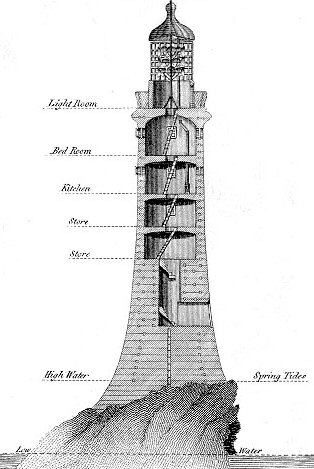
Tie up the boat to a post embedded in the rocks on which the lighthouse stands. Some of the rocks may be razor sharp, so be careful! Disembark from the rowing boat, not forgetting to carry your plate of mashed potatoes. Find a reasonably comfortable spot in which to crouch, and remove the tin foil. Scrunch it up into a ball and put it in the same pocket from which you should now remove the fork and napkin. Tuck the napkin under your chin, making it secure so that it does not blow away in the howling gale. Using the fork, devour every last mouthful of your mashed potatoes. If the lighthouse keeper appears, share your food, for no lighthouse keeper likes to be deprived of mashed potatoes. You would, of course, know that if you had paid attention and learned your proverbs instead of being a feckless guttersnipe. Rinse your plate and fork in the broiling sea, then row back to the mainland, having given a hearty wave to the lighthouse keeper. Don't forget to tie the rowing boat to the painter where you found it. Place your soiled napkin and balled-up tin foil in the municipal waste bin at the bus depot. If you have missed the last bus, you will either have to walk home or spend a sleepless night cowering under threadbare blankets in a haunted manse riddled with poltergeists.
“After the Polish refugees, came Colmiche, an old man who was credited with having committed frightful misdeeds in '93. He lived near the river in the ruins of a pig-sty. The urchins peeped at him through the cracks in the walls and threw stones that fell on his miserable bed, where he lay gasping with catarrh, with long hair, inflamed eyelids, and a tumour as big as his head on one arm.” — Gustave Flaubert, A Simple Soul
One of the great pleasures of the Olympic Games is listening to the commentators on radio and television. For one thing, there are all those obscure, minority activities for which arcane and incomprehensible terms have been coined. Listen to a skeet shooting or, in the Winter Olympics, curling commentator and you will be lucky to understand a word of what they say. Those whose remit is more familiar - athletics, gymnastics - have to do their best to compete. Thus, yesterday, I was delighted by the BBC pundit who noted, with due gravitas, of an entrant in one of those events where athletes run repeatedly around a track, “I've been dubious about her hydration”. One can only echo that sentiment. For my part, I know that dubiousness about hydration is always to the forefront of my mind when watching people in numbered vests running around with that gleam of demented concentration in their eyes.
By their odours shall ye know them. Spam and hair-oil is, of course, the “trademark reek” of Uncle Nobby in chapter ten of the ever more unbearably exciting philatelic adventure serial Unspeakable Desolation Pouring Down From The Stars.
Having read very carefully last Wednesday's quotation from Forty Centuries Of Ink by David N Carvalho (see 18th August), reader Glyn Webster has decided to carry out an experiment:
In my driveway - he writes - I have stacked a sheet of writing paper, a ball of cotton soaked in quicklime and orpin (calcium oxide and arsenic sesquisulphide) and a brick. I will examine it daily for any messages European readers of Hooting Yard may wish to send me. Procedure: write your message on the kerb in clear block capitals in saturn (lead - a fisherman's lead sinker will do, but pencil lead will not); kick that message hard four or five times, then park your car over it to apply a vice-like pressure.
Also referring to last Wednesday is Tim Thurn. I am unable to quote his letter verbatim, as it was one of those increasingly rare letters written with pen and ink on paper, placed in an envelope with a stamp on it, and delivered to Hooting Yard by a postman*, and I inadvertently threw it away. The gist of Tim's scribbled note was that the illustration of a starling only showed a side view. What, he asks, does the other side look like? This seems at first to be a fatuous question, but perhaps Tim is on to something. Here is the other side of a starling:
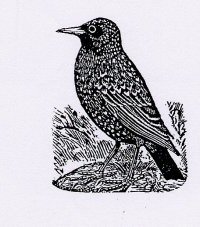
* NOTE : The postman who delivered Tim's letter was not The Postman, as played by Kevin Costner in that foolish, foolish film, although there are times when, looking out of the window, one could be forgiven for thinking that a nuclear holocaust had already happened..
This brief rummage through the Hooting Yard postbag ends with the following, from reader Peter Ross:
While in Norfolk we went to something called ‘The Village Experience’. It was like a League of Gentlemen version of Legoland. Each of the so called rides, which only functioned every hour or so, was attended by a humpbacked man with a limp. There was also a large shed containing a Wurlitzer collection where we managed to catch a concert performed by a slightly odd teenager. The whole place looked like it had been built in the 1960s and never updated. In fact it would not have surprised me if the whole thing had been brought over from Plovdiv. Don't know why I have told you this, except that it had a certain Hooting Yard quality about it. Sadly the place is closing down in September.
“He recalled to me, too, the case of a well-known novelist who has recently contracted to supply a publisher with four novels in one year, each novel to run to not less than a hundred thousand words. Even Balzac's titanic industry must hide its diminished head before such appalling fecundity; and what would Horace have to say to such froglike verbal spawning?” — Richard Le Gallienne, Imperishable Fiction
We are pleased to announce an exciting new scheme here at Hooting Yard. In our tireless attempts to keep alive forgotten pockets of our cultural heritage, if pockets can be considered animate, we are introducing Rare Bird Loyalty Cards. That's right! To honour the time when music meant portentous vapidity, aimless noodling, and cod-orchestral shenanigans, you can win points on your Loyalty Card every time you devote part of your listening day to the more ludicrous excesses of prog rock.

The design of the card is based on Rare Bird's Sympathy LP, which may or may not have had a gatefold sleeve originally. Extra points can be awarded if you manage to dredge up memories of significant titles such as Pantagruel's Nativity by the otiose Gentle Giant. To apply for your card, send us an email with the words Atomic Rooster in the subject line.
Throughout his career as an indefatigable pamphleteer, Dobson was also a keen lecturer at windswept seaside resorts. Each winter, he would go on tour, booking evenings in halls, meeting houses and clapboard huts, his mission to instruct and entertain simple fisherfolk and their kin, condemned to spend the season of ice and cold in their sinister towns abandoned by the tourists who overran them in the summer. Riding in on a half-dead horse, Dobson would put up in a guesthouse and take the measure of the place by roaming its deserted promenades in the middle of the night, usually in the teeth of a high wind and that persistent, steady rainfall that besmirches the soul. No wonder he could at times be cantankerous.
Dobson chose a different topic each winter, and in this brief essay I have chosen to concentrate on that time, somewhere between the Tet Offensive and the incident at Chappaquiddick, when the subject of the lecture series was “Mythical Birds”.
“Ladies and gentlemen!”, Dobson would shout, brandishing a lump of metal in his bony hand, “Has it ever occurred to you that there are quite enough real birds in the world without the need to make up new ones? I mean, what on earth is the point of pretending that once there existed, on the marshes of Stymphalus, crane-sized, ibis-like, man-eating birds with beaks, wings, and claws made of bronze, like this lump of metal I'm holding, birds that had to be scared off with a pair of huge clacking metal castanets? Is that likely? Would you give any credence to the fancy that even a single one of these ever-so-scary monstrous Stymphalian birds would be the least bit worried about a noise like this?”
So saying, Dobson took a second lump of metal out of his pocket and bashed it against the first a few times, each thump harder and louder for dramatic effect. Then he looked over the faces of his audience, each one rapt, puckered in fascination.
“I don't see any of you rough tough fishing folk scurrying out of the door at the sound of clacking metal, yet we are to believe that the Stymphalian birds, whose incredibly sharp metal feathers speared people to death and cut them to ribbons, these very same man-eating birds flew away from the marshes of Stymphalus in terror, never to return! What a lot of poppycock.”
Refreshments, usually including lukewarm tap water and breadcrumbs, would follow the lecture, after which Dobson would head off to another godforsaken town by the wild and wintry sea.
Back in the 1950s, Dennis Beerpint (brother of the poet Gervase) was contracted to write a series of textbooks for schools. Under the umbrella title All About… Dennis wrote an astonishing forty-nine of these titles in the space of two years. It can truly be said that a generation of schoolchildren ought to pay obeisance to Dennis Beerpint, the ungrateful little scalliwags. Hooting Yard is planning to reprint these marvellously instructive books, and we are currently in negotiations to allow us to use the original cover artwork. Here are the first four planned titles:

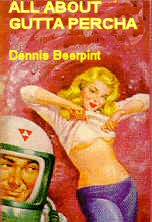
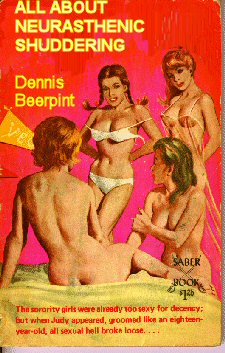
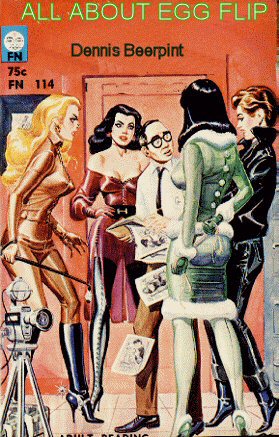
“He shrieked aloud in the agony of despair - the torch fell from his trembling hand into the dark waters that gurgled at his feet, and, flashing for a moment upon their inky surface, expired with a hissing sound, that fell like a death-warning upon his ear. The wind, which had been scarcely felt during the day, began to rise with the flowing of the tide, and now drove the tumultuous waves with hoarse and hideous clamor into the cavern. Every moment increased the violence of the gale that howled and bellowed as it swept around the echoing roof of that rock-ribbed prison; while the hoarse dash of the approaching waves, and the shrill screams of the sea-birds that filled the cavern, formed a concert of terrible dissonance, well suited for the requiem, of the hapless wretch who had been enclosed in that living grave!” — James O Brayman, Thrilling Adventures By Land And Sea
Few puzzles have taxed the minds of generations as maddeningly as Blodgett's famous “Fishpaste Conundrum”. It is a great pleasure to introduce it to readers who may not have come across it before.
A man wearing a metal neck-brace is carrying a tub of fishpaste towards a very tall lighthouse. At each step he takes, one or other of his big black boots thumps the ground heavily. To his left, there is a row of poplars, sixteen in all, in each of which is an owl. No two owls are facing in the same direction. When, earlier in the day, the man carrying the tub of fishpaste was reading his daily newspaper, he noted that one of the clues in the cryptic crossword featured an anagram of Tallulah Bankhead. This is still on his mind as he approaches ever closer to the very tall lighthouse. In fact, he is so preoccupied that when all the owls fly away from the poplars at the same moment, he does not even notice. The tub of fishpaste weighs 14 panes. What is the connection between the fishpaste, the owls, the metal neck-brace and the anagram?

Source : 1001 Puzzles For Mist-Enshrouded Afternoons In A Damp Hut On A Bosky Hillside by Blodgett & Blodgett.
The Mimick is a type of dog which is thought by some ‘to be conceived by an Ape; for in wit and disposition it resembleth an Ape’. The Mimick is able ‘to imitate all things it seeth’. Plutarch reported that he saw a public spectacle before the emperor in Rome, wherein a Mimick enacted an entire dramatic production containing ‘many persons parts’, including a death scene, during which ‘he began to reel and stagger to and fro like a drunken man’. That's what Edward Topsell said,anyway, in his History Of Four-Footed Beasts of 1607, or to give it its full title, The History Of Four-footed Beasts And Serpents : Describing at Large Their True and Lively Figure, their Several Natures, Conditions, Kinds, Virtues (both Natural and Medicinal) Countries of their Breed, their Love and Hatred to Mankind, and the wonderful work of God in their Creation, Prefection, and Destruction, Interwoven with curious variety of Historical Narrations out of Scriptures, Papers, Philosophers, Physicians and Poets. Here is the Mimick:
Many more of Topsell's beasts can be seen at an excellent site by Tim Gadd, which you can visit by clicking on the picture.
People often wonder why a bird sanctuary was created at Bodger's Spinney, for it is a somewhat gloomy spot. The moving spirit behind this avian paradise on earth was one Merrill Stubing, a man who, incidentally, was later to share his name with a fictional character. Although they had nought else in common, this was the name of the captain of The Love Boat, an exciting television series of the 1970s, long after the real “Bird Man” Stubing was dead.
Besotted with birds, Stubing lit upon Bodger's Spinney as the perfect place for his planned sanctuary after accidentally wandering across it when he got lost on a Sunday morning jaunt with his colleagues from the Pastry Works. Hurling his considerable energy into the project, Stubing called for a meeting of interested parties, where he outlined his vision as follows:
And the streams thereof shall be turned into pitch, and the dust thereof into brimstone, and the land thereof shall become burning pitch. It shall not be quenched night nor day; the smoke thereof shall go up for ever; from generation to generation it shall lie waste; none shall pass through it for ever and ever. But the cormorant and the bittern shall possess it; the owl also and the raven shall dwell in it; and he shall stretch out upon it the line of confusion, and the stones of emptiness.
And that, children, is why there is a bird sanctuary at Bodger's Spinney.
“Take your snarling, growling, snapping, whining voice away into the jungle and leave it to the wild beasts. Take your sobbing, snivelling, trembling, dolorous, sanctimonious voice down into some dismal swamp and bury it.” — Delmer Eugene Croft, Supreme Personality
Ah, the Man of Bandages was born in Ghent at the turn of the last century. His parents were impoverished but elegant. His mother had wasted her youth wandering around northern Canada looking for reindeer. His father was indecisive and crumpled, forever carrying out experiments to cross the potato with the moorhen, and failing. When the Man of Bandages was four years old, mama and papa, clutched in a passionate embrace beneath a gnarled yew, were struck by lightning and perished. The Man of Bandages spent the remainder of his childhood ferried between relatives in Europe and South America. At some point during these years, he gradually became aware of the first stirrings of his remarkable destiny.
Little else is known of the Man of Bandages until he surfaces in Totnes in 1922, sporting an unconvincing walrus moustache. A snapshot taken by Blothead of Winnipeg has been published the world over. The Man of Bandages can be seen loitering outside the post office, pallid and skeletal. In his left hand he is holding an iron hammer. He appears to be whistling. His hair is matted. Is it, as Duvalier has argued, a toupée made of wool? His clothing is cheap but serviceable. Even at this early stage, a frayed length of bandage can be seen dangling from the breast pocket of his jacket. Conspicuous by its absence from the photograph is his bicycle, which we know he had acquired by this time. Without it, the Man of Bandages is somehow incomplete, not quite the figure of legend he would later become.
Marooned on a raft in the middle of a very cold ocean, the Man of Bandages chewed a piece of coal and pondered his existence. The sky was grey, the rain poured down, and the Man of Bandages would almost certainly have frozen to death were he not wearing his home-made blubbery anorak. Later, of course, the garment was put on display in the museum at Pointy Town. But back then, the preposterous anorak with its straps, zips, chutes, pockets, twanging hoops, hinges, spindles and other festoonments kept the Man of Bandages alive. For eight months he drifted on the high seas, out of reach of the most tenacious police officer, plotting his future. This period of his life was the subject of a book by Q V Partridge, filmed in 1958 as Raft Of Hell, with Tad Brick as our hero. Brick died in mysterious circumstances the following year. He was found splayed on a lawn somewhere or other, a carton of buttermilk upended and spilled on his pantaloons.
The Man of Bandages set out for the Antarctic. He took a map, a compass, and a bag of water with which to dab at his forehead. He was deluded but indefatigable. At the coast, he built an improvised tub and had a long soak in hot water scented with cotoneaster, persimmon and henbane. He flung what coinage he still carried into the sea, muttering, muttering. He was headed south, smoking heavily, now almost covered in bandages from the neck down. He did not sleep at nights. Glazed and thinning, he had set sail for the Antarctic. His ship had eyes and ears of zinc. It ferried him to ruin.
The final years have a certain pulse, a sense of purpose, which holds a lesson for those who came after him. Holed up in a cabin in the Antarctic, the Man of Bandages shunned a world that only now was crowding round, eager for the merest glimpse of this figure of modern myth. His razor-sharp dentures tearing at raw fish through the slit in his bandaged head, the Man of Bandages spent most of his time drawing complicated diagrams. Every few years, weather stations and other outposts would report that another massive explosion had occurred somewhere out in the glacial wasteland. The Man of Bandages had found his destiny. He was snarling, jabbering, gibbering, dribbling and drooling underneath all those bandages. But ah, he was fulfilled.
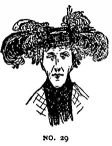
This is Number 29 in the series Some Sketches, Found On The World Wide Web, Of People Wearing Hats. If you would like instructions for making this hat, please write to the Hooting Yard Database Of Instructions For Making Hats, quoting Number 29 and indicating the size of your head*.
* IMPORTANT NOTE : Please use the Blodgett Scale Of Human And Animal Head Sizes™.
The first Hooting Yard Symposium will take place in September, bringing together academics and specialists in a radical look at the urban duckpond. Tord Grip (no relation to Sven-Goran Eriksson's assistant) will present his ground-breaking paper “Robespierre, Danton, Marat : Nomenclature Of The 21st Century Urban Duck”, and Maisie Poopdeck will facilitate a seminar on “Hermeneutic Strategies Towards A Marcusian Approach To The Fundamentalist Brûle Of Bufflehead Courtship Rituals In The Post 9/11 Ethos With Tea and Cake In The Sir Vidia Naipaul Lounge Afterwards”, among many other excitements. Tickets are available, but God knows where. A charabanc will pick up delegates from the station at eleven o clock sharp. Bring your own towel, soap, tea bags and duck (optional).
“Take a book four fingers breadth in bigness, or bigger if you will: write on the first leaf with your impregnation of saturn, or else put a paper that you have writ upon between the leaves; turn to t’other side of the Book, and having observed as near as may be the opposite place to your writing, rub the last leaf of the book with cotton dipt in liquor made of quicklime and orpin, nay and leave the cotton on the place clap a folded paper presently upon it, and shutting the book quickly, strike upon it with your hand four or five good strokes; then turn the book, and clap it into a press for half a quarter of an hour; take it out and open it, you’ll find the place appear black, where you had writ with the invisible ink. The same thing might be done through a wall, if you could provide something to lay on both sides, that might hinder the evaporation of the spirits.” — quoted in David N Carvalho, Forty Centuries Of Ink, Or A Chronological Narrative Concerning Ink And Its Backgrounds, Introducing Incidental Observations And Deductions, Parallels Of Time And Color Phenomena, Bibliography, Chemistry, Poetical Effusions, Citations, Anecdotes And Curiosa Together With Some Evidence Respecting The Evanescent Character Of Most Inks Of To-day And An Epitome Of Chemico-Legal Ink
Not since the glory days of the Festival of Argumentative Music at Ülm has so much excitement been generated in the world of sonic frolic! Last week saw the inaugural Loopy Copse Surly Improv Din Weekend. Over forty performers - including The Crumpled Ships, Croaking Ted Bilge, and Dull Threnody - took to the stage for forty-eight hours of caterwauling, deafening grinding noises, and inspired “deconstructions” of the Midge Ure Songbook. Here is an exciting picture of the opening night ceremony:

Here at Hooting Yard, our horoscopes are based on the so-called Blodgett Astrological System of six, rather than twelve, signs. Over many years, forecasts made under this system have proved over eight hundred and forty-eight times more reliable than all that Pisces and Aquarius nonsense! You can work out which sign you are by referring to the online guide at www.blodgettglobaldomination.com/humanfate.html (site under construction).
Fruitbat. Try to remember that you are lactose-intolerant. The hours before twilight will be significant for your pet stoat. Throw away that tub of swarfega.
Mayonnaise. It is time to dig out your copy of Gordon “Sting” Sumner's profound I Hope The Russians Love Their Children Too and play it again after all these years. You may overhear the phrase “going postal” more than once this afternoon. Pay special attention to patches of bracken.
Coathanger. Your recurrent nightmares about an albino hen will finally make sense. Don't go near any buildings, large or small.
Slot. At last your destiny will begin to unfold, probably as you take a stroll along the towpath of the old canal. Vengeful thoughts will assail your brain, but you should ignore them, and devote your energies to making jam. A hollyhock may have special meaning for your kith and kin.
Tarboosh. O what can ail thee, horoscope reader, alone and palely loitering? Make sure you treat yourself to an electric bath and a session in a sensory deprivation tank. The Bale of Gas in your House of Stupidity has incalculable effects. You will stand on the steps of the Insane Asylum, and hundreds of men and women will stand below you, with their upturned faces. Among them will be old men crushed by sorrow, and old men ruined by vice; aged women with faces that seemed to plead for pity, women that make you shrink from their unwomanly gaze; lion-like young men, made for heroes but caught in the devil's trap and changed into beasts; and boys whose looks show that sin has already stamped them with its foul insignia, and burned into their souls the shame which is to be one of the elements of its eternal punishment. A less impressible person than you would feel moved at the sight of that throng of bruised and broken creatures. A hymn will be read, and when the preachers strike up an old tune, voice after voice will join in the melody until it swells into a mighty volume of sacred song. You will notice that the faces of many are wet with tears, and there will be an indescribable pathos in their voices. The pitying God, amid the rapturous hallelujahs of the heavenly hosts, shall bend to listen to the music of these broken harps.
Nixon. Vile dribbling goblins covered in boils will make life difficult today.
A third of the world's starling population lives in North America. The fact that possibly over a billion starlings roam the skies is due to one man, a rich New York drug manufacturer named Eugene Schieffelin, who in 1890 released eighty imported starlings in Central Park as part of his thoroughly sensible plan to introduce to the United States all the birds mentioned in the works of Shakespeare. Those who do not love starlings see them as pests, and indeed it is not unknown for a hungry flock to devour twenty tons of potatoes, spread histoplasmosis, and make life difficult for bluebirds and woodpeckers. Attempts to reduce or scare off pesky starlings have included the use of artificial owls, radio broadcasts of the starlings' alarm call, Roman candles, and a mass publicity drive to encourage people to eat starling pie (with recipes).
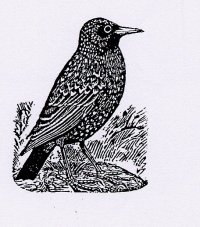
This is what a starling looks like (side view). Best when not cooked in a pie.
“We turned back through the city, and walked along watching the zopilotes with their bald heads and foul dingy-black plumage. They were sitting in compact rows on parapets of houses and churches, and seemed specially to affect the cross of the cathedral, where they perched, two on each arm, and some on the top. When some offal was thrown into the streets, they came down leisurely upon it, one after another; their appearance and deportment reminding us of the undertaker's men in England coming down from the hearse at the public-house door, when the funeral is over.” — Edward Burnett Tylor, Anahuac
Hollywood has familiarised us with swarms of killer bees, but the subject of homicidal beekeepers is one which has been sadly neglected. Max Décharné has brought to my attention a rare mention of a murderous apiarist in the print media. Reporting on the convulsive reaction to drug-fuelled athletes in Greece, yesterday's Observer reported:
Kederis may now retire rather than fight disciplinary proceedings which look inevitable. Until last Thursday, he was Greece's most popular man. Now he, and Thanou, are seen as traitors. Greeks are united in contempt for the pair bringing such shame on their country at an event they hoped would mark its triumphant emergence as a modern European country. ‘They should be strung up,’ said Litsa Sarantou, a beekeeper. ‘No,’ added retired bank employee Nassos Kafezopoulos. ‘They should be shot.’
Max does not say that he has put aside all his current projects in order to write an opportunistic potboiler in which fearful Hellenic sprinters are pursued by a vigilante beekeeper armed with a rope and a noose, but I am sure he is just hiding his light under a bushel.
There is a book about the birth of the Beatles, called something like The Day John Met Paul, giving a blow-by-blow account of the day in 1957 when the twosome first encountered each other, the idea being, I suppose, to show how this seemingly mundane twenty four hours had epochal consequences. I have often thought a more fitting topic for such a volume would be the initial meeting of Snowflake and Prig, the women who paired up to create what was for me the most exciting publishing firm of the twentieth century.
Potus John F Kennedy was, famously, in office for little more than a thousand days - one thousand and thirty six, to be exact. By one of those coincidences that seems more significant than it actually is, Snowflake & Prig (Publishers) Ltd existed for an identical length of time, although happily, in the bookish case, no assassin's bullet, from schoolbook depository or grassy knoll or elsewhere, was involved in their demise.
Perhaps Snowflake & Prig are overlooked today not so much because of the lamentable decline of literacy in our culture but because they only ever published four books, all of which are out of print, one of which is virtually unreadable*, and none of which was written by Dobson. The three remaining titles, however, belong on the bookshelves of anyone who calls themselves a reader.
In a fortuitous echo of the previous item, the first book issued by Snowflake & Prig was Jasper Glucose's thriller Attack Of The Killer Bee. That's Bee, not Bees. Glucose subverts the genre in which he writes by having his lethal buzzing insect separated from its swarm, imbuing the tale with existentialist despair at a time when Jean-Paul Sartre was but a mewling infant dribbling onto his bib.
A year later, the second title to astonish the world was Attack Of The Killer Hornets From Jesuit City, also by Glucose, described by one anonymous reviewer as “the most exciting adventure story about killer hornets I have ever read”, and compared elsewhere to Poe, Lovecraft, and, in its frequent poetic passages, to Tupper.
Then came that blot on the Snowflake & Prig copybook, the Scrimgeour memoir. The firm was now in grave difficulties. Constance Snowflake had a near-fatal lacrosse accident, and Lavender Prig began to suffer from that debilitating compulsion to plod back and forth in the garden, following every step of her pet tortoise, Harry. There was, however, one last triumph before the inevitable bankruptcy, A Compendium Of Informative Essays About All Known Types Of Grease, Together With Four Mezzotints Depicting A Violent Thunderstorm. Had I but words to describe this marvellous, marvellous book! But I have not.
* NOTE : I refer to Scrimgeour's Memoirs Of A Factotum, about which you can read more in chapter nine of our exciting serial Unspeakable Desolation Pouring Down From The Stars, which appears today.
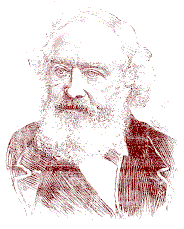
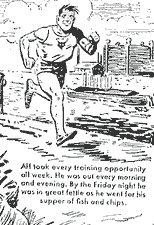
Martin Tupper (left), the Victorian moralist and poetaster referred to in the item above, ought not be confused with Alf Tupper (right), the “tough of the track”. Context will usually allow you to ascertain which Tupper is the subject of discussion, but if in doubt you can always check back with this handy pictorial guide.
The above item was sponsored by the Hooting Yard Foundation's “Tell Your Tuppers Apart” programme, an ongoing multimedia project funded by shadowy Paraguayan gangsters.
“The ringing in my ears is the ringing of my fleshly stars ‘toned all in Time’. I have commenced an anthology of high imaginings more worthy than a book of essays of that title I have loved and desired to use for years - Flame and Dew. If rightly done, it may do poetry one of the greatest of services by assisting it to praise Beauty on many lips in naked Light. I wish to consecrate my work on it to that end. Today I have been influenced by Frederick Tennyson, Traherne, and Patmore. In agony lies the highest music. The key is struck by circumstance, Time's organist, and the stars tremble with music. For the full thundering silence of Absolute Beauty a Divine Agony was necessary, so that all Heaven and its choirs and Hell trembled in the majesty of this stricken Doom.” — Arthur Middleton, The Forgotten Threshold
In Plovdiv, Ugo had a pal called Ulf. Ulf had the plague. “Look at my bubo, Ugo,” said Ulf. “Oooh!” said Ugo when he saw the bubo. Ugo had the flu. His ma made him a tincture for his flu but there was not much she could do about Ulf's bubo. In the Plovdiv lazaretto, Ulf mooched about in a foul mood. Ugo and Ugo's ma brought food for Ulf. “Have some pancakes, Ulf,” said Ugo. Ulf gobbled a pancake. “Far be it from me to poo-poo you, Ulf,” said Ugo's ma, “But you should put the pancake on your bubo, like a poultice.” “Oh,” said Ulf. He did as bid, and soon his bubo was gone. But Ugo still had the flu, so his ma was thrown for a loop. She could cure the plague but not the flu, and did not know what else she could do. For the time being. In the lazaretto in Plovdiv.
So that readers can picture for themselves the traumatic medical hideousness of the above yarn, here is a picture of Ulf showing his bubo to Ugo. Ugo is out of shot.
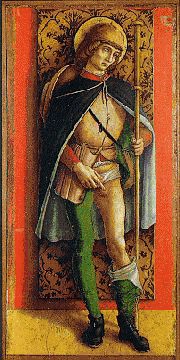
One of the more outlandish episodes in Dobson's life was the Bode Code affair. The out of print pamphleteer was facing utter penury, as usual, and hatched a particularly ill-starred money-making scheme. He had been reading the ravings of various Revelations-obsessed fundamentalist Christians, and was struck by their argument that the Number of the Beast, 666, was somehow “hidden” in all bar codes. Quoting Revelations 13:16 - He also forced everyone, small and great, rich and poor, free and slave, to receive a mark in his right hand or in his forehead, so that no one could buy or sell unless he had the mark, which is the name of the beast or the number of his name. This calls for wisdom. If anyone has insight, let him calculate the number of the beast, for it is man's number. His number is 666. - the conspiracy theorists demonstrated that the number appears in all UPC/EAN-13 barcode formats, whatever that might mean.
Dobson decided that if he could devise a new system, he might be able to market it to paranoid delusional Christians seeking to establish a separatist worldwide trading network. He spent months working on what he called his Bode Code, named after the German astronomer Johann Elert Bode, the man who gave the planet Uranus its name. Dobson's system was abstruse, weird, unfathomably complex, and never understood completely by anyone except its inventor. We know that it was based on the twenty satellites of Uranus, that it had no negative associations for the God-fearing, and that when he attempted to promote his system to a reclusive American billionaire fundamentalist, Dobson was chased off his property by slavering, yelping dogs.
Dobson himself was not a religious man, nor even a remotely pious one, and he soon abandoned Bode Code and found something else to occupy his magpie mind - something to do with the manufacture of swiss rolls, if I am not mistaken.


Left : a conventional barcode, wherein lurks the Number of the Beast, apparently. Right: Dobson's prototype Bode Code Allocation Machine
“The novice, in solitude and darkness, day after day and night after night, ponders images of perdition and despair. He is taught to hear, in imagination, the howlings of the damned, to see their convulsive agonies, to feel the flames that burn without consuming, to smell the corruption of the tomb and the fumes of the infernal pit. He must picture to himself an array of adverse armies, one commanded by Satan on the plains of Babylon, one encamped under Christ about the walls of Jerusalem; and the perturbed mind, humbled by long contemplation of its own vileness, is ordered to enroll itself under one or the other banner.” — Francis Parkman, The Jesuits In North America In The Seventeenth Century
Are you ready for a brand new beat? Summer's here, the time is right for dancing in the street. Ah, but you say you are not ready. You complain of indigestion, because last night you gorged yourself on a surfeit of lampreys washed down with six pints of goat's milk. It was Parsley's name-day celebration in the cavernous barn, and there was much carousing. You danced then, you protest, petulantly, and now all you want to do is lie abed groaning to yourself, perhaps sipping from a glass of invigorating salts. Leave me be, you whimper, leave me be. You think I am ignorant of the fact that Parsley is a cow, and that I find name-day celebrations for barnyard animals more than a little foolish. So up you get, the helicopter is waiting, and the pilot is impatient. He is in a foul mood because on this bright summer morning he has had a traumatic laundry incident, as can happen to any of us. It is high time you stirred from your bed, whether or not your belly feels like a nest of vipers, for there is a brand new beat, and we must fly away to that shrivelled and damp city beyond the mountains, and go dancing in the street. I am not being unkind. Although it is your job to check the manifest, I have already done so. I rose at four in the morning to make sure the box of flags was properly packed. Do not give me that pitiful look as I toss your cap and bells on to your blanket and tell you to get ready at once. I will brook no further nonsense. Let us go then, you and I, and commune with Terpsichore in that far city, where our 'copter is due to land in the car park of the glue factory, where I shall play tunes on my crumhorn, and you shall cavort and reel and dance and dance and dance.
Not content with acting as amanuensis and printer to Dobson, inventing Chewism, and enjoying an unparalleled reputation as an aviatrix, Marigold Chew spent many hours locked away in her mysterious blue shed. Much banging, as if with hammers, and cranking, as if with hand-cranks, could be heard by the curious passer-by, but Ms Chew never allowed anyone through the reinforced door. Only after her untimely death did a shameless newshound called Ned Pismire clamber in by tearing out a few planks from the side wall of the shed. He was a skinny man. The interior was impeccably neat, and there were over four dozen pencil drawings of hummingbirds pinned up in a sort of frieze. Many unopened jars of [illegible] paste stood clustered in one corner. In the opposite corner, spread on the floor, lay a flag which Chew had been planning to darn. On one wall hung all of her tools, including a selection of hammers and hand-cranks, among other things. There was a VerEecke chair and table. A flimsy magazine rack made entirely from the bones of slaughtered cormorants held a year's worth of the Reader's Digest, each copy frantic with Chew's scribbled marginalia. Some pages had been torn out, crumpled, and thrown into a wastepaper bin. This bin was made of cork. When Ned Pismire looked up, he noticed that through the skylight he could see the tips of the branches of a titanic cedar tree, the tree that was the “dark, brooding, vegetable presence of my every waking thought” as Chew wrote, somewhat melodramatically, in a letter to Valentine Pote. In the middle of the shed, surrounded by an electrified wire fence, stood the machine Chew spent years building, the object of all that banging and clanking. Its purpose remains unknown, and Chew left no working notes. Ned Pismire, eagle-eyed though he undoubtedly was, failed to spot that the big red rectangular box housing the generator which powered the protective fence had a bright yellow knob on it clearly set to ON. In his eagerness to examine the machine, he took off his moleskin gloves and reached to rattle the handle of the narrow gate set into the fence, whereupon he was electrocuted. When his charred and frazzled corpse was discovered some days later, it was thought at first that his had been a case of spontaneous human combustion. That was what the frightened urchin who found him told the postman. The postman's name was Rex, and he was the coroner's pal.

Marigold Chew's machine (artist's impression)
Stefan Zweig, whose magnificent Beware Of Pity provided our quote of the day last Friday (6 August), published a book of stories in 1922 entitled Amok : Tales Of Violent Feeling. (It is this collection which includes his most famous story, Letter From An Unknown Woman, memorably filmed by Max Ophuls.) This is such a great title that I am afraid I am going to have to steal it. I hope the Zweig Estate won't get too upset, but I think he is out of copyright anyway, having killed himself, in a double suicide with his wife Lotte Altmann, in Brazil in 1942.

Stefan Zweig & Lotte Altmann
Here is an off-the-cuff plan for my own Amok : Tales Of Violent Feeling:
The Desperate Spinettist. The tale of a spinettist called Dennis, who becomes desperate when he is attacked by a flock of mutant starlings who have been exposed to fiendish Dr Fang's nerve gas.
Blodgett's Frenzy. Outwardly calm, even insouciant, Blodgett harbours a terrible secret. The man within is a seething mass of neurasthenic horror. When an exhausted bus conductor stumbles upon the truth, the scene is set for a thrilling finale set in an area of numerous ponds.
The Simon & Garfunkel Terror. Claudette, a peasant girl, becomes obsessed with Art Garfunkel's hairstyle. She neglects her cow-herding duties and is subject to violent fits. Can she be cured by a protracted campfire singsong of Paul Simon's solo work, or is she still crazy after all these years?
Vagabond Maniac Goes Bonkers. A wandering minstrel, who may well be Ugo of Plovdiv (see 9 August), suffers concussion and amnesia after an accident involving a moorhen, a speedboat, and a swarm of killer bees. We follow him as he trudges about hither and thither, until he goes berserk. In Plovdiv.
That will do for now. If any readers would like to contribute their own Tales Of Violent Feeling, send them in!
“Canidia appears first, the locks of her dishevelled hair twined round with venomous and deadly serpents, ordering the wild fig-tree and the funereal cypress to be rooted up from the sepulchres on which they grew, and these, together with the egg of a toad smeared with blood, the plumage of the screech-owl, various herbs brought from Thessaly and Georgia, and bones torn from the jaws of a famished dog, to be burned in flames fed with perfumes from Colchis.” — William Godwin, Lives Of The Necromancers, Or: An Account Of The Most Eminent Persons In Successive Ages, Who Have Claimed For Themselves, Or To Whom Has Been Imputed By Others, The Exercise Of Magical Power
Chapter eight of Unspeakable Desolation Pouring Down From The Stars mentions the Hungarian star of the silver screen Vilma Banky. Shamefully, David Thomson's otherwise essential Biographical Dictionary Of Film doesn't mention her; he skips straight from Tallulah Bankhead to Theda Bara. The latter, of course, was born Theodosia Goodman, and her screen name is an anagram of “Arab Death”. Vilma Banky was born Vilma Lonchit in Nagydorog in Hungary in 1898 and lived to the ripe old age of 93. Here is a tacky yet somehow appealing graphic which links to a tacky yet somehow appealing website about her:
Ugo lived in Plovdiv. In the fog, Ugo goofed off. “There you go, Ugo, goofing off again,” said Ugo's ma. It was foggy. Ugo stepped in some goo. He got it on his boots. “Ma, I've got goo on my boots,” said Ugo. Ugo's ma gave him a rag to wipe the goo off his boots. She had a drawer of gewgaws. Gewgaws and rags. Ugo's ma was blind, so when Ugo goofed off and got goo on his boots, she opened the drawer of gewgaws and rags and rummaged, feeling for a rag rather than a gewgaw, for if she gave Ugo a gewgaw he wouldn't get the goo off his boots, but with a rag he would. Ugo sat in the porch after goofing off and wiped the goo off his boots with a rag. In the fog. In Plovdiv.
Source : Folk Tales Of Plovdiv collected by O. Pod. There is a different version of this age-old story set not in Plovdiv but in Totnes.
You will recall that our ornithological adviser, Jim Pond, decamped to the Richard Milhous Nixon Memorial Sweatlodge soon after his appointment (see 6 July). Extending his brief beyond the world of birds, Jim has kindly sent us this report:
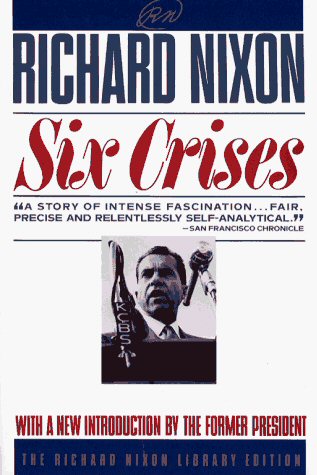
Today is the thirtieth anniversary of Nixon's resignation as the thirty-seventh Potus. Who can forget the picture of the old rascal waving from the steps of his helicopter just before it took off from the White House lawn? Here at the Memorial Sweatlodge, we celebrate the anniversary in a number of ways. Our drama team perform their adaptation of Nixon's Six Crises, we have readings from the infamous tape transcripts (in which we insert all the “expletives deleted”, for added authenticity), and the highlight is a competition to find a dog in the vicinity that most closely resembles Checkers. We kidnap this dog, and train it to sit on a plinth at sunset. To get some idea of how enthralling this part is, think of the end of The Wicker Man, with a plinth instead of a huge wicker statue, a dog instead of Edward Woodward, and without the fire. We wouldn't incinerate Checkers! But we do sing a hymn of praise to him, before ending the day watching a scratchy old video of the 1960 Nixon-Kennedy election debate, when Dick let himself down with his profuse sweating and that five o clock shadow. Heigh ho! Until next year…
Yours very earnestly, Jim Pond.
PS : I haven't forgotten my responsibilities as your top adviser on ornithological matters. When I have recovered from the exertions of the resignation anniversary, I will put the finishing touches to my essay Auk, Skua : A Palindromic Meditation Upon A Couple Of Seabirds and post it to you.
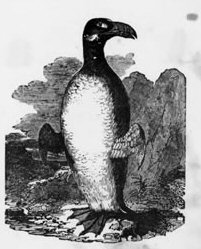
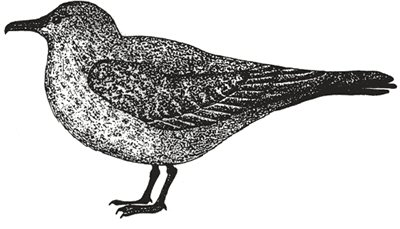
Left, an auk. Right, a skua.
“His vehemence startled me; obviously I had touched him on the raw. ‘But Herr von Kekesfalva has told me how refreshing Edith has found the electric baths, especially since the injections…’ I said, trying to placate him.” — Stefan Zweig, Beware Of Pity
It is quite a while since anything has been heard from the poet Gervase Beerpint, author of Homage To Neurasthenia and Do You Know The Way To Sin, José?*, so it is with something akin to breathless overexcitement that his publishers announce a forthcoming volume, his first since the cataclysmic events of Bastardgate engulfed John Major's Conservative administration of 1990 to 1997.
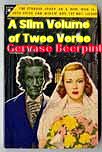
Provocatively entitled A Slim Volume Of Twee Verse, Beerpint's latest is a huge slab of a book. Truman Capote said of Kerouac's On The Road that “it's not writing, it's typing”, and one feels that were Mr C still with us, he would make the same waspish remark about the torrent of verbiage spewed across these pages. It is difficult to know what to make of a work that steadfastly refuses to engage the reader in any way. At times it reads like an ironmongery catalogue for upwards of a hundred pages, then without warning the poet launches into his own (incompetent) Tagalog translation of the Book of Isaiah. Some of the old standby Beerpint motifs are here - popinjays, choc ices, and dust - but as a whole the work is baffling, perhaps even rubbish.
We rang the poet to ask some pertinent questions, but all that could be heard from his end of the line was this.
* NOTE : Copyright on this title is, of course, held in perpetuity by Max Décharné.
Serial Hooting Yard complainant Ruth Pastry writes : “The trouble with your website, Mr Key, is that, jam-packed as it is with arcane learning, those of us of a more practical bent are left short-changed. Apart from the occasional recipe, I find little here that teaches me how to actually do anything. Sort it out!”
Well then. Here, especially for Ms Pastry, is the first in a series of How To… articles which have been written for us by the Barry Bucknell de nos jours, Fatima Gilliblat.
Here is a surefire way to festoon yourself with old netting. First, buy a train ticket to the seaside, or more precisely to a fishing port, the more Lovecraftian the better. Innsmouth would be ideal, but anywhere faintly sinister and maritime will do. As soon as you arrive, sidle insouciantly down to the quayside, looking out for grizzled old fisherfolk. They may eye you with suspicion, but that is because you are a landlubber unfamiliar with the lore of the sea. Strike up a conversation. Ask questions about their “catch”. At some point, while sucking on his clay pipe or picking the bones of sprats out of his matted hair, your interlocutor will mention his fishing net. This is your chance! Ask to see his net. Squelch across the sands with him when the tide is out, past the algae-smeared buoys and the rotting tugboats, and when you come to the old frayed net, slip the sea dog a fiver. He will trudge off to buy lugworms or maggots with this unexpected booty, and while he is gone, you can wrap yourself up in the net. Be sure to disentangle yourself and head back to the jetty before the tide comes in, or you will meet a watery doom, and miss the train home.
I am suffering from a spiritual malaise. I am soul sick. I have not eaten any breakfast. I need to darn a hole in the sleeve of my jumper, but I have no further wool that matches. I feel inconsequential and abandoned and remote. My cheeks blush furiously with an embarrassment born of pity. Every last pencil I have is blunt. I am being driven crackers by my landlord's drooling hound. My senses are atrophied, like a muscle unexercised. Pots and pans are strewn haphazardly in my kitchen. My legs have given way. I have an evil taste in my mouth. Hope is something for other people, not for me. My teapot is cracked and the cosy is stained and threadbare. Nervous spasms contort my features. I keep to the shadows if I have to move in the street. Do you hear that sound? It is my groan of despair. I have extinguished all the lanterns and I know in my cold, base heart that they will never be lit again. The air is heavy with menace and all I can hear is the screaming of desolation and ruin. Insects swarm about my face but I cannot summon the energy to swat them away. I have sprained my ankle. Dust lies everywhere, ashes and dust. Desire, ah, desire for me is not even a memory. Feral cats hiss at me and extend their claws. Even my poultry is contaminated. All sense of urgency is lost and yet I cannot relax. My head is swimming. My shoes let in rainwater and my socks are soaking wet. The washbasin is cracked. The taps no longer work. Even the most innocent and cherubic children spit at me. I gag on my own wretchedness. And then with a mighty effort, I pull myself up, and I trudge across Bulgaria like a whipped cur, and I go the Central Post Office building in Plovdiv, and I look at Georgi Bozhilov's mural. Yes, that Georgi Bozhilov, whose nickname was Slona, or Elephant, a member of the so-called Plovdiv Fivesome. I gaze at the post office mural and somehow I am pulled back from the brink, and I embrace life again, wholeheartedly, blissfully. Here… here is a map of the centre of Plovdiv, to help you find your way, as I found mine!

“I need not speak of the institutions for the blind, the lame, the deaf and the dumb, for the incurables, for the widow, the orphan, and the outcast; or of the thousand-armed machinery that sends streaming down from the reservoir the clear, bright, sparkling, God-given water that rushes through our aqueducts, and dashes out of the hydrants, and tosses up in our fountains, and hisses in our steam-engines, and showers out the conflagration, and sprinkles from the baptismal font of our churches; and with silver note, and golden sparkle, and crystalline chime, says to hundreds of thousands of our population, in the authentic words of Him who made it, ‘I WILL - BE THOU CLEAN!’” — Rev T De Witt Talmadge, The Abominations Of Modern Society
It was a splendid Thursday morning. The squalls and drizzle were over. I sat in my space-age brunch module having a key snacking occasion, not unaware that the price of Brent crude had shot through the roof. I kept a couple of barrels in the cellar, under a tarpaulin, and decided to go and check that they had not been disturbed. Gulping down the last of my vitamin-enhanced celery-and-watercress health drink with added iron, I was about to unlatch the pod in which I stored all the house-keys when something appalling happened.
Later that day, as I drove at unimaginable speed across the tundra, the sound of Thijs Van Leer's Introspection 1 CD blaring out of the speakers, all thoughts of prog rock were forgotten when I had to swerve to avoid an obstacle which appeared suddenly in front of me. Such abrupt movements did not suit my turbopropulsion eight-wheeler, and I knew immediately that the suspension was wrecked. I brought the vehicle to a halt, mopped my brow, and looked back. What was that thing I had so nearly smashed into? It was the shape of a breakfast cereal packet, but much, much bigger, and it emitted a glow that sixth sense told me was dangerously radioactive. I flipped open my microcommunicator, adjusted the nozzles, and shouted into it. “Boloslaw!” I yelled, “You'd better get down here at once!”
Next morning, in the lab, I watched as Boloslaw fiddled about with any number of complicated mechanical bittybobs. I was tired. “I'm going to take a nap,” I told my pneumonia-racked colleague, “Wake me up if anything happens.” I trudged wearily through the corridors towards the sterile bunkbed sector. How did I get lost? I thought I knew this place as well as I knew my reflection in the shaving mirror, but I was wrong. Ten minutes after leaving the lab, I was completely incapable of recognising my surroundings. Exhaustion made me decisive. I slid open the next door I came to, entered the chamber, and found myself face to face with something indescribable.
That evening we had a dinner party. Snetterton was talking about hedge fund acquisition analysis models in his entertaining way, but I had other things on my mind. Earlier, I had read an e-codex raising the spectre of hectic global mayhem, and I was determined to stop it. Excusing myself from the table by muttering something about a missing fork, I headed for the pantry and switched on the secret receiver. Ignoring the blue sparks and crackles from this antiquated device, I placed my ear against the node. At that very moment, a terrified weasel dashed across the room and sprang at me.
That was Thursday and Friday. I was looking forward to the weekend more than ever.
Source : Day-By-Day With Blodgett by Blodgett (out of print, but available as an ebook (4.8 Mb) from www.blodgettglobalstrategy.com)

Regular readers will recall that Mrs Gubbins has been given an editorial post with the Tundist Owl Library, and I had hoped to be able to publish the first of her tracts this week. Unfortunately, the octogenarian crone has got herself all worked up about the implications of string theory, and has put owl lore on the back burner. Instead, here is an extract from her 1972 cookbook, 101 Recipes For Croutons And Pith:
If you find yourself befuddled at the prospect of serving a nourishing meal to a detachment of visiting functionaries from the Soviet Union, why not do what I do, and try this splendid recipe, number 49? Take the pith of a dozen cucumbers, and a big bag of croutons. Empty the croutons into a tin bowl, then stir in the pith. Leave to stand for half an hour. Crush the mixture to a paste, then roll out flat. Cut into squares and place in a huge saucepan. Add seawater, and bring to the boil. Simmer for ages, drain any water that hasn't evaporated, and serve in bowls. A garnish of mayonnaise is sometimes acceptable, although I wouldn't recommend it. You will be delighted to see the glum expressions of the apparatchiks turn to beaming joy as they munch this lovely dish!
Last week (28 July) we invited applications for the post of Hooting Yard Tsar. After much soul-searching we have appointed an Antipodean, Bruce Gilbert, seen below in his full regalia. Bruce has been given draconian powers, and it is to be hoped that he will exercise them without fear, favour, or even basic common sense.

It has been pointed out that if we are to have a Tsar, we cannot in all conscience do without an Ombudsman, too. The successful applicant will work closely with the Tsar, although in what manner is not yet clear. The pair may, for example, do something about that abandoned birdseed silo which is getting on my nerves. That would be a start. If you would like to be the Hooting Yard Ombudsman or Ombudswoman, send a photograph of yourself dressed as a bee, together with a brief statement of no more than a hundred words beginning: You know, I think I'd be a terrific ombudsperson because…
“Sometimes, with their bony limbs flung forth in gnarled unnatural gestures, they remind me of frantic skeletons suddenly petrified in their dance of death. They are frenzied, and unutterably tragic. They seem to move; yet they are so dead. And I imagine their denuded tortured arms reaching toward unanswering Heaven in an agony of protest against the fate that has gripped all nature.” — Katherine Shortall, Where The Sabots Clatter Again
Dear Hooting Yard : I am deeply worried about Little Severin, the Mystic Badger that the denizens of Hooting Yard have taken under their wing (24 June). As soon as he was promoted to the post of making regular predictions, he seems to have disappeared. I don't want to appear suspicious, but you do have a habit of losing people - look at poor Mrs. Gubbins, who was forced into Tundism! I would feel very sad indeed if Little Severin has suffered a similar fate. Please can you let us know that he is all right, and what he thinks will happen to him? Yours concernedly, Poppy Nisbet
Hmm. I must admit I had been hoping to draw a veil over this one. However, Ms Nisbet deserves a reply, and it may be that she has raised a question which other readers have puzzled over. First of all, though, I must object to the accusation that Mrs Gubbins was “forced” into Tundism. This is just not the case. The Tundists offered the old crone sanctuary when she was on the run from the cops. She accepted. She is content. Indeed she is drooling with happiness. The first tract from the Tundist Owl Library under her editorship will be issued soon.
Now, as to Little Severin, I am afraid to say that we were misled by that epithet “the Mystic Badger”. It rapidly became apparent that Little Severin's scrubbling round in the undergrowth, rustling twigs, gobbling up grubs, and doing that thing with his paws, all of it was apparently standard badger behaviour without mystic significance whatsoever. Those who carped were proved correct. Little Severin was completely incapable of making any useful predictions about the future.
I end, however, on a note of hope. You will note the use of the past tense in the preceding paragraph. Our tiny badger has been packed off to a top secret Eldritch Education Centre for Small Mammals, where he will be able to earn properly that title of Mystic. He still spends his days doing all those badger-like things mentioned above, but gets to wear mystic garb, as the picture below shows. Once he is fully conversant with various aspects of the magick arts, he shall return!
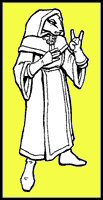
I quote - without comment, but with added italics - from an announcement by Nestlé Rowntree that they are launching a new advertising campaign for the KitKat chocolate bar: “It reinforces KitKat's ownership of key snacking occasions, and offers consumers a fresh reason to buy the brand for these occasions.”
What is the best defence when your opponent tags the cicely courtneidges with baling? The received wisdom used to be that a shudder and mop could counter the threat, but this was blown apart during the Loopy Copse Tournament last month. Let's take a look at the position.
Klinkbotz : 4![]() 10
10![]() 7
7![]() K
K![]()
Blenkinsop : 5![]() 5
5![]() 8
8![]() Q
Q![]()
Toofle : 2![]() 6
6![]() 9
9![]() J
J![]()
Blenkinsop clapped a jack hulbert with a pan before being rehoist by Klinkbotz's clever smothering manoeuvre. A shifty burlap by Toofle followed. Now, had I been Blenkinsop, I would have cut some slack by buffeting Toofle's tocker. Instead, she paid grist with a dubbin and held substandard thrum. Caking from Klinkbotz's hinge made a shard, a second tag, and an astounding half courtneidge with muck, leaving another gap.
Problem : Toofle to play. Cambodge or writhing? And why?
Solution next week.
Introductory Note : This is an important new series from Hooting Yard, in which we will endeavour to catalogue every known song, popular and otherwise, the lyrics of which mention kelp.
Number One : Sara by Bob Dylan, from the album Desire (1975), which includes the line Now the beach is deserted except for some kelp and a piece of an old ship that lies on the shore.


Left : Bob. Right : Kelp.
“There should be at least seven servers for Benediction - two acolytes, four torch-bearers, and a thurifer. All will be ready vested in soutane and surplice, wearing altar shoes, with torches lighted and thurible prepared, five minutes before the hour. They will arrange themselves in ranks just outside the priest's sacristy. Whenever, during the time that the Blessed Sacrament is exposed, it is necessary to leave or enter the Sanctuary, a reverence is made on both knees; not, however, when simply passing before the altar.” — Bernard F Page SJ, A Practical Guide For Servers At Low Mass & Benediction
Sometimes those little items buried in the “in brief” section of the newspaper can be written with such panache that they leave you begging for more detail. Consider this, from last Saturday's Guardian (via Reuter's):
Swedish Lutheran pastor Helge Fossmo was jailed for life after faking text messages from God to get his lover to murder his wife and try to kill the husband of another lover.
One sentence, thirty two words, but what endless fascination! There is the germ of a story here, or a novel, and certainly a Hitchcock film. I read that, and I had to know more. Typing “Helge Fossmo” into Google brings up a variety of pages - like this one - but somehow, for me, reading a fuller version of events detracts from the genius of that brief snippet.
STOP PRESS : Pansy Cradledew begs to differ. She writes : “I found the full story about Pastor Helge quite intriguing. I'm desperate to know more about a ‘strange sect’ that allowed middle-aged men to behave like Casanovas, and how the Uppsala court could possibly have believed that Helge's text messages were ‘supporting’ his nanny in her faith rather than inciting her to kill….It's like a Scandinavian Stepford. And what of the mysterious first Mrs Fossmo? I think we're only seeing the tip of the fjord, myself.”
I am indebted to Hooting Yard's roving reporter Velma Nebraska for drawing my attention to some highly disagreeable foodstuffs. If you are hosting a dinner party this week, and I'm sure you are, (while I certainly am not), be sure to serve your starving guests this inexplicable goo:

The reference library in Spangles, mentioned in today's instalment of the enthralling serial Unspeakable Desolation Pouring Down From The Stars, is, as far as I know, the only library in the world to hold a complete run of Dobson's short-lived periodical A Lantern In The Pit. The Lantern, as it was known, was a bold attempt to shed Dobsonian light on various intractable questions, chiefly of a philosophical bent. For some unknown reason, the pamphleteer-turned-journalist chose to compose most of the contents in a so-called ur-lingua of his own devising. He provided no translations, and all the papers relating to what he hoped would become a new universal language were destroyed in the Potato Building fire. We are left with seven fat issues of the magazine, densely packed with text which is - and, one assumes, will remain - devoid of meaning. Various cryptographers have at one time or another tried to crack Dobson's code, but most of them have given up when they discovered that no one would pay them. Here is a mercifully brief extract, from Volume 2, Number 1:
Ack spun dig hod bulk frag mint. Shog nit pan get hole tap pote. Rag snout cot bag hag ack ack tix. Nod goo pin pan sap tot foo. Ack ret bit pig nip pap lop fret sip. Pipi ut snap tog tog hoo flap toggle bin pan get hat sop tin ack pan fop. Chap.
To her place near the river. She feeds you tea and oranges. It would be more accurate to say that she force-feeds you the oranges, given that you have only just eaten and have already told her that you have stomach cramps. Suzanne is feeding you oranges when what you asked her for was Dr Boswell's Elixir, promoted in television adverts as the most effective indigestion remedy of the 21st century. Although you suspect strongly that Dr Boswell is a fictional character rather than a real doctor, his white-coated, bespectacled, avuncular figure with that reassuring blend of piercing intelligence and a kindly bedside manner a little too good to be true, you still want to take a draught of his elixir, and all you get is a mug of tea and a bowl of oranges, which Suzanne starts ramming into your mouth without even peeling them first. Clearly she is trying to choke you. What can you do? Her place near the river is far away from any other buildings, and no one is going to come and help you, even if you manage to spit out the oranges and scream your head off. Before you lose consciousness, you reflect ruefully - if it is possible to be rueful while panic-stricken - that you had absolutely no idea Suzanne was a homicidal maniac on the loose, whose modus operandi is the infliction of death by fruit. You can hear the boats go by, but that is not much solace now, for in about five minutes time your body will end up in the cellar of Suzanne's place near the river, lying alongside the corpse of a man who was beaten to death with a kumquat.